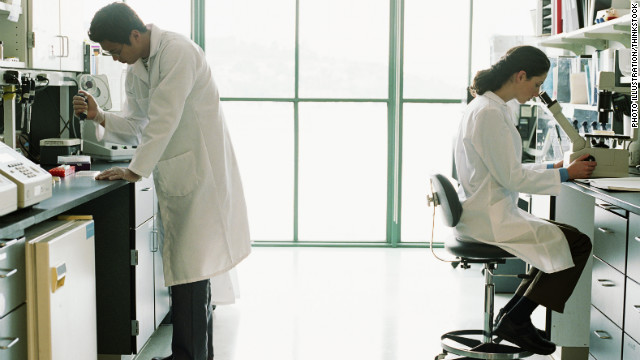- EDITION: U.S.
- INTERNATIONAL
- MÉXICO
- ARABIC
|
|
|

May 4th, 2012
07:08 AM ET
NIH launches program to spur new drug therapiesCountless Americans are suffering from thousands of diseases for which there are no treatments. In an effort to develop new therapies for them, the National Institutes of Health launched a new program Thursday. The program is designed to match their researchers with experimental compounds currently not in further development from drug companies. "Americans are eagerly awaiting the next generation of cure and treatments to help them live longer and healthier lives. To accelerate our nation's therapeutic development process, it is essential that we forge strong, innovative and strategic partnerships across government, academia and industry," said Health and Human Services Secretary Kathleen Sebelius. The compounds have already cleared a number of hurdles in the development process including safety testing in humans. NIH Director Francis Collins says he is happy to serve as a matchmaker. While researchers have identified the cause of more than 4,500 diseases, Collins says effective treatments are only available for about 250 of them. He hopes that compounds that were not effective against the disease they were originally developed for prove to be useful for other conditions. The HIV prevention drug AZT is an example of a drug that was a failure against it's first opponent - cancer. According to Collins, it currently takes on average $2 billion over a 14-year period to move a drug discovery from the lab to treatment. This new program would save researchers time and money because they wouldn't be starting from scratch. "Clearly, we need to speed the pace at which we are turning discoveries into better health outcomes," Collins said. "NIH looks forward to working with our partners in industry and academia to tackle an urgent need that is beyond the scope of any one organization or sector." According to the NIH, under the new agreement, drug companies will retain ownership of their compounds, and their research partners retain intellectual property rights and the rights to publish the research. At the time the contract is negotiated, the drug company and the investigator determine how the profits will be divided. Pfizer was the first drug company to sign on. "We have these wonderful molecules that have all the properties to be clinical research tools," Rod MacKenzie, group senior vice president, head of Pfizer PharmaTherapeutics Research and Development said. "The great hope that we have is having invested in these molecules already we may be able to connect with the great ideas and take these drugs all the way to market." Collins calls the program a "win, win, win" - for investors, pharmaceutical companies and for patients. "I'm hoping out of this comes real advances for people who are waiting for us to come up with answers." |
About this blog
Get a behind-the-scenes look at the latest stories from CNN Chief Medical Correspondent, Dr. Sanjay Gupta, Senior Medical Correspondent Elizabeth Cohen and the CNN Medical Unit producers. They'll share news and views on health and medical trends - info that will help you take better care of yourself and the people you love. |
|
|
|
Reblogged this on Meir Weiss' Blog.
Two dozen.... They've got to be kidding me what is that going to accomplish. Even a pilot program should utilize at least 1,000.
This pilot program of a dozen is going to cost NIH $20 million. So, if you wanted to do 1,000, you'd need over a billion dollars. Somehow, I don't think that'll happen.
Suggestion: Fix your quote in third paragraph- "Americans are eagerly awaiting the next generation of cure and treatments to help them live linger and healthier lives. I'm sure people would rather live LONGER, not linger.
Right, we don't have enough drugs already. How about quitting all the drugs and getting off your as ses and exercising instead? And stop eating so much garbage? It would be amazing how many fewer ailments we would have, and how much longer we would live. Jack Lalanne's life story comes to mind.
Hardly I can believe that.
P.S. Please review our icons for Windows and windows13icons.